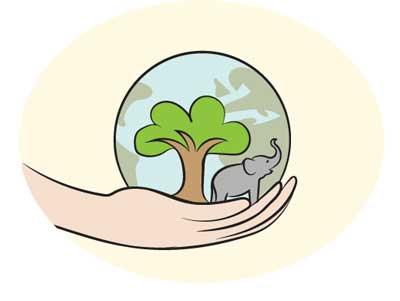Reply To:
Name - Reply Comment
The famous British artist Matt Monro sang: “Born free as free as the wind blows, as free as the grass grows, born free to follow your heart; Live free, and beauty surrounds you, the world still astounds you, each time you look at a star; Stay free where no walls divide you, you’re free as a roaring tide so there’s no need to hide; Born free, and life is worth living, but only worth living, ‘Cause you’re born free.”

This song comes to mind as the United Nations marks World Wildlife Day (WWD) early next month. In a statement to mark the event the United Nations- affiliated World Wildlife Day organisation says On December 20, 2013, at its 68th session, the UN General Assembly proclaimed March 3 – the day of signature of the Convention on International Trade in Endangered Species of Wild Fauna and Flora– to raise awareness of the world’s wild animals and plants. The General Assembly also set up a secretariat to implement the Convention on International Trade in Endangered Species of Wild Fauna and Flora (CITIES). It was to be the facilitator for the global observance of this special day for wildlife on the UN calendar. World Wildlife Day has now become the most important global annual event dedicated to wildlife.
WWD will be celebrated this year under the theme “Recovering key species for ecosystem restoration”. The celebrations will seek to draw attention to the conservation status of some of the most critically endangered species of wild fauna and flora, and to drive discussions towards imagining and implementing solutions to conserve them. All discussions will be inspired by and seek to inform efforts towards the achievement of UN sustainable development goals --no poverty, zero hunger, ensure sustainable consumption and production patterns, climate action, life below water and life on land.
According to data from the International Union for Conservation of Nature (IUCN) Red List of Threatened Species, more than 8,400 species of wild fauna and flora are critically endangered, while close to 30,000 more are understood to be endangered or vulnerable. Based on these estimates, it is suggested that more than a million species are threatened with extinction. Continued loss of species, habitats and ecosystems also threatens all life on earth, including us. People everywhere rely on wildlife and biodiversity-based resources to meet our needs, from food, to fuel, medicines, housing, and clothing. Millions of people also rely on nature as the source of their livelihoods and economic opportunities.
This year, WWD will therefore drive the debate towards the imperative need to reverse the fate of the most critically endangered species, to support the restoration of their habitats and ecosystems and to promote their sustainable use by humanity.
In a message to mark the event, the UN Secretary General António Guterres says each year, on WWD, we celebrate the beauty and wonder of our planet’s wild plants and animals. Why do we care about wildlife? Beyond a moral duty to sustain the Earth, humanity depends on the essential products and services that nature provides, from food and freshwater to pollution control and carbon storage. By damaging the natural world, we threaten our own well-being. Today, all around the world, wildlife is in peril. A quarter of species face the threat of extinction, in large part because we have destroyed nearly half of the ecosystems in which they live. We must act now to reverse this trend. This year’s WWD highlights the importance of the UN Decade on Ecosystem Restoration (2021-2030). Ecosystems are only healthy when their component species thrive. If just one keystone species disappears, an entire ecosystem can start to decline and die. This is why actions to protect individual species must go hand-in-hand with restoring entire ecosystems. On this WWD let us commit to preserving our invaluable and irreplaceable wildlife for the benefit and delight of current and future generations.
What is the situation in Sri Lanka? with the cost of living skyhigh and millions of people struggling for survival, with farmers, fisherfolk, teachers, principals and others warning of a public revolt, the Gotabaya Rajapaksa Government is virtually becoming a family dictatorship and huge plots of lands are being sold to foreign investors to set up hi-tech projects that might endanger wildlife and biodiversity. Our leaders need to act like statesmen and work for the next generation but it appears that most of them are acting like self-centred politicians and working for the
next election.